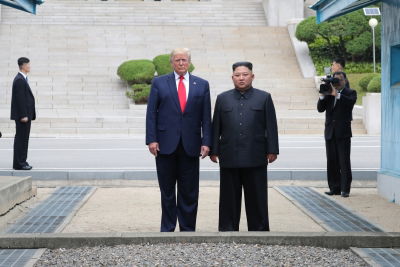America
South Korea, US not discuss agenda for possible Kim-Trump meeting: Official

Seoul, Oct 28
South Korea and the United States have not coordinated agenda items related to a possible meeting between US President Donald Trump and North Korean leader Kim Jong-un this week, the Unification Minister said Tuesday.
Seoul's top point man on North Korea, Chung Dong-young, made the remarks during a parliamentary audit amid speculation that Kim and Trump could meet this week on the occasion of the Asia-Pacific Economic Cooperation (APEC) gathering, Yonhap news agency reported on Tuesday.
"I believe there have been no discussions between South Korea and the US based on the assumption of a North Korea-US meeting," Chung said when asked if Seoul and Washington have coordinated agenda items such as denuclearization or sanctions relief to brace for a possible Kim-Trump meeting.
Chung said, however, that Trump's recent reference to North Korea as a sort of 'nuclear power' has effectively removed a barrier to dialogue with Kim.
The minister said he expects Kim Yo-jong, the powerful sister of the North's leader, may issue a statement Tuesday or Wednesday over North Korea's stance on Trump's proposal to meet with Kim.
Trump has made repeated calls signaling his intent to meet with Kim during his trip to South Korea from October 29-30, saying he is "open" to talks with him and describing North Korea as a "sort of nuclear power" at the beginning of his ongoing Asia swing.
He also told reporters aboard Air Force One en route to Tokyo on Monday that he "would love to" meet with Kim if the North Korean leader agrees, while suggesting the possibility of sanctions relief for Pyongyang.
During the audit session, Foreign Minister Cho Hyun said Trump's remarks could "definitely" serve as an inducement to bring Pyongyang back to the dialogue table, though the North may now be seeking a "bigger bill" from Washington in return.
Compared with 2018, North Korea has secured a military pact with Russia and strengthened its ties with China, Cho said. "Simply put, I think North Korea could be raising its bill for talks with the US," he added.
Regarding Trump's suggestion that sanctions could be part of a potential offer to Pyongyang, Cho said, "The sanctions issue is complex, and it will likely be difficult for sanctions relief to serve as a precondition for dialogue. The U.S. stance on sanctions will depend on how North Korea responds at the negotiating table."
If realised, it would mark the first meeting between Kim and Trump in more than six years since their surprise brief meeting at the inter-Korean truce village of Panmunjom in 2019.
In the same audit, Cho also said there are significant differences between the U.S. and other member economies over including a phrase reaffirming the principle of free trade in the upcoming APEC summit declaration.
"There have been instances in the past where APEC leaders failed to issue a joint declaration due to a lack of consensus, but this time, negotiators are working to produce a consensus-based statement," he said.
While acknowledging that the international economic order "cannot return to the past," Cho stressed the importance of "renewing our commitment to dialogue, problem-solving, and regional partnership."































